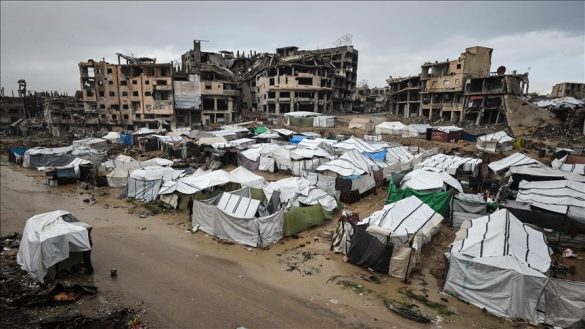GAZA CITY ( WNAM MONITORING ): Heavy rains have damaged over 22,000 tents sheltering displaced families in Gaza and left more than 288,000 households without protection, local authorities said Wednesday.
Bad weather conditions have worsened the situation in Gaza, causing an estimated $3.5 million of damage, after large areas of the displacement camps were rendered uninhabitable by floods, Ismail Thawabteh, head of Gaza’s Government Media Office.
He said more than 288,000 families are now left without real protection against cold and rain, despite repeated government appeals for 300,000 tents and mobile homes.
“The international response to our appeals has been extremely limited and insufficient to match the scale of the disaster,” he said.
He pointed out that the primitive sewage networks in Gaza were damaged, and temporary water networks were disrupted.
The food sector “suffered heavy losses,” with large quantities of food supplies and aid destroyed, Thawabteh said.
He added that more than 10 mobile medical points were disrupted, and essential medicines and supplies were lost due to difficulties in moving across flooded areas.
The weather depression also destroyed alternative energy equipment and lighting within the camps, including solar panels used by displaced families to meet their basic needs amid electricity cuts.
“The Israeli occupation continues to prevent the entry of tents, insulation materials, heating, energy, and sewage supplies, worsening the disaster” in Gaza, he said.
Thawabteh called the ongoing Israeli blockade on Gaza “a clear violation of humanitarian obligations under the ceasefire agreement and a breach of international humanitarian law.”
He called on US President Donald Trump and the guarantors of the ceasefire agreement to “take immediate action to compel the (Israeli) occupation to lift restrictions on the entry of shelter, heating, energy, water, and sewage materials.”
He warned that the continued Israeli siege “will escalate the humanitarian suffering to levels that are difficult to manage.”
On Tuesday, Stéphane Dujarric, spokesperson for the UN Secretary-General, warned that displaced Palestinian families in Gaza face the risk of flooding inside inadequate shelters, noting that residents are highly exposed to danger due to worsening weather conditions and that ongoing Israeli restrictions are impeding the entry of vital aid and the work of relief organizations, including UN partners.
Since October 2023, the Israeli army has killed nearly 70,000 people in Gaza, mostly women and children, and injured 171,000 others in a brutal war that has left much of the enclave in ruins.
Local authorities estimate that Gaza needs about 300,000 tents and prefabricated housing units to meet the basic shelter needs of Palestinians, after Israel destroyed the infrastructure during two years of bombardment.
Under a ceasefire deal that took effect on Oct. 10, Israel was supposed to reopen Gaza’s crossings and allow entry to shelter materials, including tents and mobile homes, but failed to abide by its obligations under the deal despite repeated Palestinian appeals.


